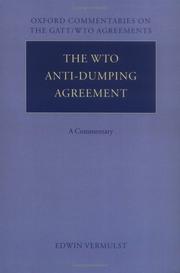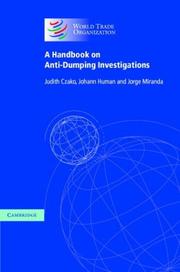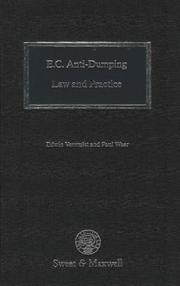| Listing 1 - 10 of 35 | << page >> |
Sort by
|
Book
ISBN: 3631334435 Year: 1998 Publisher: Frankfurt am Main Lang
Abstract | Keywords | Export | Availability | Bookmark
 Loading...
Loading...Choose an application
- Reference Manager
- EndNote
- RefWorks (Direct export to RefWorks)
Antidumping duties --- Law and legislation --- Anti-dumping duties --- Antidumping tariffs --- Contingent duties --- Countervailing duties --- Tariff
Book
ISBN: 0199087873 Year: 2007 Publisher: Delhi ; Oxford : Oxford University Press,
Abstract | Keywords | Export | Availability | Bookmark
 Loading...
Loading...Choose an application
- Reference Manager
- EndNote
- RefWorks (Direct export to RefWorks)
Gains from globalization are threatened by pressures of protectionism among countries. In this context, anti-dumping has emerged as a critical area. This book analyses the importance of anti-dumping agreement from the perspective of developing countries and examines their roles and concerns.
Antidumping duties --- Free trade --- Law, Politics & Government --- Law, General & Comparative --- Law and legislation --- Anti-Dumping Agreement
Book
ISBN: 1874698279 Year: 2004 Publisher: London Cameron May
Abstract | Keywords | Export | Availability | Bookmark
 Loading...
Loading...Choose an application
- Reference Manager
- EndNote
- RefWorks (Direct export to RefWorks)
Antidumping duties --- Subsidies --- Law and legislation --- ANTI-DUMPING -- 341.1 --- OVEREENKOMST -- 341.1 --- HANDELSINSTRUMENTEN IN EUROPEES RECHT -- 341.1
Book
ISBN: 9789041199669 Year: 2019 Publisher: Deventer Wolters Kluwer
Abstract | Keywords | Export | Availability | Bookmark
 Loading...
Loading...Choose an application
- Reference Manager
- EndNote
- RefWorks (Direct export to RefWorks)
The book gives detailed attention to all legislative, regulatory and judicial developments that have arisen under EU and World Trade Organization (WTO) laws on trade defence instruments up to February 2019, including the amended 2018 EU anti-dumping regulation. This book continues to provide comprehensive, up-to-date analysis and critical commentary on EU instruments dealing with anti-dumping, countervailing, safeguard and trade barrier measures. The emphasis throughout is on the practical application of the rules.
europese commissie --- importations --- who --- commission europeenne --- invoer --- WHO(wereld handelsorganisatie) --- antidumpingmaatregel --- europese unie --- mesure antidumping --- union européenne --- antidempingo priemonė --- protidumpingové opatření --- antidumpningsåtgärd --- masë antidumping --- protudampinška mjera --- antidumping --- środki antydumpingowe --- medida antidumping --- мере против дампинга --- protidampinški ukrep --- dumpinguvastane meede --- antidumpingforanstaltning --- misura antidumping --- anti-dumping measure --- polkumyynnin vastainen toimenpide --- dömpingellenes intézkedések --- Antidumpingmaßnahme --- antidempinga pasākumi --- антидампинг мерка --- beart frithdhumpála --- miżura tal-anti-dumping --- antidumpingové opatrenie --- μέτρα αντιντάμπινγκ --- антидъмпингова мярка --- anti-dumpingmaatregel --- мерки против дампингот --- antidampinška mjera --- pretdempinga pasākumi --- medida anti-dumping

ISBN: 0199277079 9780199277070 Year: 2005 Publisher: Oxford [etc.] : Oxford University Press,
Abstract | Keywords | Export | Availability | Bookmark
 Loading...
Loading...Choose an application
- Reference Manager
- EndNote
- RefWorks (Direct export to RefWorks)
Commercial law. Economic law (general) --- Law of international organizations --- Antidumping duties --- Dumping (International trade) --- Antidumping law --- Foreign trade regulation --- Law and legislation --- Law and legislation. --- DROIT ECONOMIQUE INTERNATIONAL --- ANTI-DUMPING --- ORGANISATION MONDIALE DU COMMERCE ( OMC ) --- OMC --- REGLEMENTS DES DIFFERENDS --- PROCEDURE

ISBN: 0521830427 1107138876 1139189131 9786613378538 1139162039 1139187856 1139183222 1283378531 113919044X 1139185543 9780521830423 9781139190442 9781139162036 9781139187855 9781107138872 9781283378536 9781139189132 6613378534 9781139183222 9781139185547 Year: 2003 Publisher: Cambridge Cambridge University Press
Abstract | Keywords | Export | Availability | Bookmark
 Loading...
Loading...Choose an application
- Reference Manager
- EndNote
- RefWorks (Direct export to RefWorks)
The subject of anti-dumping procedures has received growing attention in international trade policy and has become a source of tension between countries. This handbook covers the major areas arising in anti-dumping investigations as embodied in the relevant WTO provisions, providing an exposition of well-sourced information, explanations and guidance for grasping the intricacies of anti-dumping proceedings. Beginning with a chronicle of an anti-dumping investigation, the book proceeds to consider the crucial issues involved: calculation of dumping margins and determinations of injury and causation. Well-structured and easy to follow, the handbook is designed to assist, in a practical way, investigators delegated the authority to conduct the required investigation. Clearly presented and informative, this book will also interest government officials involved in international trade policy, importing and exporting enterprises affected by anti-dumping investigations, and their representatives, including private legal practitioners and consultants, and academic readers concerned with international trade issues.
Dumping (International trade) --- Law and legislation --- Law and legislation. --- Antidumping law --- Foreign trade regulation --- Droit international --- Organisation mondiale du commerce --- Law --- General and Others --- Dumping (International trade) - Law and legislation --- Anti-dumping
Book
Year: 2014 Publisher: Washington, D.C., The World Bank,
Abstract | Keywords | Export | Availability | Bookmark
 Loading...
Loading...Choose an application
- Reference Manager
- EndNote
- RefWorks (Direct export to RefWorks)
What kinds of changes in foreign competition lead domestic industries to seek import protection? To address this question this paper uses detailed monthly U.S. import data to investigate changes in import composition during a 24-month window immediately preceding the filing of a petition for protection. A decomposition methodology allows a comparison of imports from two groups of countries supplying the same product: those that are named in the petition and those that are not. The same decomposition can be applied to products quite similar to the imports in question, but not subject to a petition. The results suggest that industries typically seek protection when faced with a specific pattern of shocks. First, a persistent positive relative supply shock favors imports from named countries. Second, a negative demand shock hits imports from all sources just prior to domestic industries' petition for protection. The relative supply shock is a broad one; it applies both to named commodities and to the comparison product group. The import demand shock, by contrast, is narrow, hitting only named products. The latter shock is also large: import growth over the two-year window is 15 percentage points lower in named products than in reference products, with most of this gap arising in the final two quarters before the petition. The negative import demand shock appears to be a key event in the run-up to the filing of a petition. It has been missed by previous studies using more aggregated data.
Access to Markets --- Anti-Dumping --- Economic Theory & Research --- Endogenous Trade Policy --- Import Dynamics --- International Economics & Trade --- Macroeconomics and Economic Growth --- Markets & Market Access --- Trade Policy --- Water & Industry --- Water Resources
Book
Year: 2010 Publisher: Washington, D.C., The World Bank,
Abstract | Keywords | Export | Availability | Bookmark
 Loading...
Loading...Choose an application
- Reference Manager
- EndNote
- RefWorks (Direct export to RefWorks)
To understand the role of trade policies in the crisis of 2008, this paper constructs the overall trade restrictiveness indices for a wide range of countries using their tariff schedules in 2008 and 2009. The index summarizes the trade policy stance of a country, taking into account the share of each good in trade as well as its corresponding import demand elasticity. Results show that there is no widespread increase in protectionism via tariff policies since the global financial crisis has unfolded. While many countries have adjusted tariffs upward on selected products, only a handful of countries, such as Malawi, Russia, Argentina, Turkey and China focus on products that have significant impacts on trade flows. The United States and the European Union, by contrast, rely mainly on anti-dumping duties to shield domestic industries. Overall, while the rise in tariffs and anti-dumping duties in these countries may have jointly caused global trade to drop by as much as USD 43 billion during the crisis period, it explains less than 2 percent of the collapse in world trade.
Ad valorem --- Agricultural products --- Anti-dumping cases --- Anti-dumping duties --- Domestic industries --- Economic Theory & Research --- European Union --- Financial crisis --- Free Trade --- Imported items --- Imported products --- International Bank --- International Economics and Trade --- International Trade --- Law and Development --- Macroeconomics and Economic Growth --- Policy Research --- Protectionist device --- Regional trade --- Regional trade agreements --- Trade and Services --- Trade flows --- Trade Law --- Trade measures --- Trade Policies --- Trade Policy --- World Trade Organization
Book
Year: 2010 Publisher: Washington, D.C., The World Bank,
Abstract | Keywords | Export | Availability | Bookmark
 Loading...
Loading...Choose an application
- Reference Manager
- EndNote
- RefWorks (Direct export to RefWorks)
To understand the role of trade policies in the crisis of 2008, this paper constructs the overall trade restrictiveness indices for a wide range of countries using their tariff schedules in 2008 and 2009. The index summarizes the trade policy stance of a country, taking into account the share of each good in trade as well as its corresponding import demand elasticity. Results show that there is no widespread increase in protectionism via tariff policies since the global financial crisis has unfolded. While many countries have adjusted tariffs upward on selected products, only a handful of countries, such as Malawi, Russia, Argentina, Turkey and China focus on products that have significant impacts on trade flows. The United States and the European Union, by contrast, rely mainly on anti-dumping duties to shield domestic industries. Overall, while the rise in tariffs and anti-dumping duties in these countries may have jointly caused global trade to drop by as much as USD 43 billion during the crisis period, it explains less than 2 percent of the collapse in world trade.
Ad valorem --- Agricultural products --- Anti-dumping cases --- Anti-dumping duties --- Domestic industries --- Economic Theory & Research --- European Union --- Financial crisis --- Free Trade --- Imported items --- Imported products --- International Bank --- International Economics and Trade --- International Trade --- Law and Development --- Macroeconomics and Economic Growth --- Policy Research --- Protectionist device --- Regional trade --- Regional trade agreements --- Trade and Services --- Trade flows --- Trade Law --- Trade measures --- Trade Policies --- Trade Policy --- World Trade Organization

ISBN: 0421561505 Year: 1996 Publisher: London : Sweet & Maxwell,
Abstract | Keywords | Export | Availability | Bookmark
 Loading...
Loading...Choose an application
- Reference Manager
- EndNote
- RefWorks (Direct export to RefWorks)
Antidumping duties --- Dumping (International trade) --- Foreign trade regulation --- Droits antidumping --- Commerce extérieur --- Law and legislation --- Droit --- Réglementation --- Dumping --- 351.82*6 EU --- 351.824 EC --- -Dumping (International trade) --- -Antidumping law --- Anti-dumping duties --- Antidumping tariffs --- Contingent duties --- Countervailing duties --- Tariff --- Mededingingsrecht. Kartelrecht--EU --- Economische wetgeving i.v.m. handel, industrie--EC --- -Law and legislation --- -Mededingingsrecht. Kartelrecht--EU --- 351.824 EC Economische wetgeving i.v.m. handel, industrie--EC --- 351.82*6 EU Mededingingsrecht. Kartelrecht--EU --- -Anti-dumping duties --- Antidumping law --- Commerce extérieur --- Réglementation --- Antidumping --- Dumping (Commercial policy) --- Competition, Unfair --- International trade --- European Union countries
| Listing 1 - 10 of 35 | << page >> |
Sort by
|

 Search
Search Feedback
Feedback About UniCat
About UniCat  Help
Help News
News